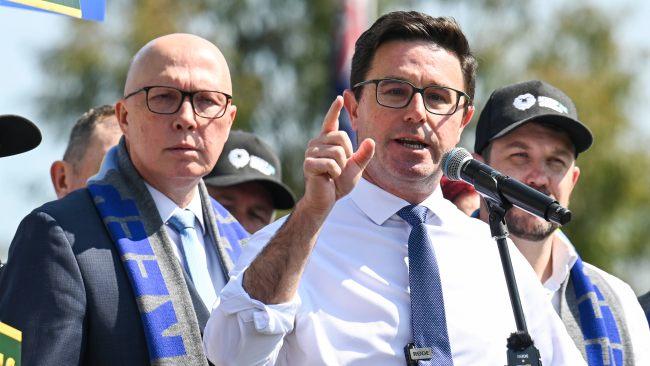By PHILIP HOPKINS
HIGH energy prices remain a key driver of inflation, but withdrawing from the Paris climate accord would damage Australia’s agriculture and regional communities, according to the Leader of the Nationals, David Littleproud.
Mr Littleproud, interviewed on Sky News, said the federal government wanted the Reserve Bank to cut rates as a political pathway to an election victory.
“But the reality is that Australian’s interest rates have stayed longer, higher for longer, because of the ideology that they bring to their economic policy and their energy policy,” he said.
“The reality is that our discretionary spending stopped a long time ago, but our fixed spending didn’t.”
Mr Littleproud said that was because “our energy bills kept going up and we had to keep paying it”.
He said the federal government tried to paper over that with six-and-a-half billion dollars worth of subsidies to try and get to that $275 reduction in energy bill that the Prime Minister, Mr Albanese, promised, yet people saw their energy bill go up by over $1000.
“We welcome some downward pressure on inflation, but when you see the rest of the world has already got interest rate cuts and had those reductions to give them that ease of cost-of-living pressure, unfortunately we’re late to the party and we’re still not fixing the fundamentals,” he said.
Mr Littleproud said the energy grid would actually be one of the biggest determinants of keeping inflation stickier for longer; thus inflation would continue at a level that could be a lot less.
“Just remember prices have gone up 3.2 per cent over this last quarter, so they’re still going up. So what we’re saying is, there’s more action that could happen and unless you get rid of the ideology and lean into the practical reality, you’re going to continue to pay more,” he said.
Considering the nexus between inflation and high energy prices, Mr Littleproud was pressed why the Liberal leader, Peter Dutton, had recommitted to the Paris Agreement, which stipulates net zero emissions by 2050 even after US President, Donald Trump had taken America out of it.
“Again, when you got the world’s biggest economy abandoning Paris, and when anybody who’s studied the economics and engineering and physics of this can see that net zero by 2050 is not even achievable for Australia, let alone the world, why shouldn’t the Coalition abandon that plan now and just try to reduce emissions in an economically sensible way without setting an artificial deadline?” the interviewer, Chris Kenny, asked.
Mr Littleproud said the reality is that the US is the biggest economy in the world.
“We’re 27 million people. We’re a trading nation. And what we’ve got to be able to do is, to be able to say is that if we go against the rest of the world, that it’s not weaponised against us. And that means for my people that I represent, the resource sector and the agricultural sector and regional communities that rely on them, is that they’ll have a tariff potentially put on their product that they send out on a boat,” he said.
“They’ll also see that their capital could be weighted anywhere from one point a half to three per cent. You think your interest rates are tough now, you add that on because we haven’t signed up to an international commitment. So you’ve got to think about our place in the world and the reality and the impacts of us wanting to lead the charge.”
Mr Littleproud said people in regional Australia would be the ones that hurt the most because the world would retaliate against us “because we’re not as big as the United States”.
“So we’ve got to be sensible about this and that’s why we’re not going down an all-renewables path, that doesn’t make sense. And we don’t have to achieve this by 2030; 2050 is a long way off and there’s no linear pathway. What you’re experiencing today is a linear pathway of what Labor’s trying to achieve by 2030,” he said.
“But we’ve got to weigh this up in the economics of what impact that would have, if only the United States has gone and the rest of the world hasn’t. We leave ourselves vulnerable. And that’s why those in the agriculture sector, in the mining sector as well, they’ve said they sign up to it by 2050 because they don’t want to see those punitive financial penalties because we’re an outlier in the world, because of our place in the world, our size of the world.”











